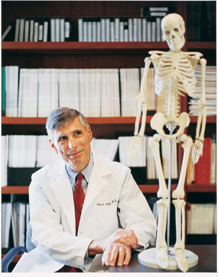Leslie
Williamson |
|
 |
|
Dear friends and colleagues,
During the past couple of decades, our knowledge of the internal workings of cells and their methods of communication has expanded rapidly. As a result, the effort to understand how fundamental chemical and electrical activities control cognition, behavior, social interaction and the very essence of humanity stands as one of our greatest opportunities at the dawn of the 21st century.
The prospect of unraveling the secrets of the brain and human behavior seems palpable and recently led me to establish the university-wide Neurosciences Institute at Stanford, one of our Stanford Institutes of Medicine. By bringing together biomedical investigators with chemists, educators, engineers, ethicists, lawyers, mathematicians, physicists, psychologists and others, we have the opportunity to visualize the brain and its functions.
Emerging technologies — most immediately functional MRI and molecular imaging — can shed light on how we think and behave. They can also diagnose and define when the brain’s functions are disordered by disease. With their help we can begin to unravel the brain’s electrical and chemical networks and discover how they govern behavior, help us to think, control our emotions, construct a belief system, hold a conviction or even tell a lie. These advances will continue to raise important new questions, including how we use this knowledge and how we share it.
These are a few of the issues considered in this special report of Stanford Medicine on the science and ethics of exploring the mind. As we go forward, vexing questions will be inescapable. Insights from the fields of forensics and neuroethics are especially important in determining our course.
Scientists are not alone in their quest to better understand the brain and the mind. His Holiness the Dalai Lama probably doesn’t spring to mind when you think of neuroscience. Yet Tibet’s religious and political leader has been considering questions of the relationship of the brain and behavior to faith, belief systems and meditation for many years. Because of this the School of Medicine and the Office of Religious Studies at Stanford invited the Dalai Lama to share his knowledge and perspective. Indeed, on Nov. 5 the Neuroscience Institute at Stanford and its director, William Mobley MD, PhD, will hold a symposium with the Dalai Lama and leaders in neuroscience and Buddhism exploring the brain and how it influences craving and suffering. A glimpse at that discussion is featured in this issue.
Clearly, you'll be using your brain as you read through this magazine. I urge you also to stretch your mind and consider how the entry into this brave new world of brain and behavior will compel researchers and the medical community to truly confront a wide range of ethical questions that need to be addressed as we touch the most basic part of what it means to be a human being. I hope you will write and share your reflections on this topic with me and your friends and colleagues at Stanford.
Sincerely,
Philip A. Pizzo, MD
Professor of Pediatrics and of Microbiology and Immunology
Carl and Elizabeth Naumann Professor
Dean, Stanford University School of Medicine

